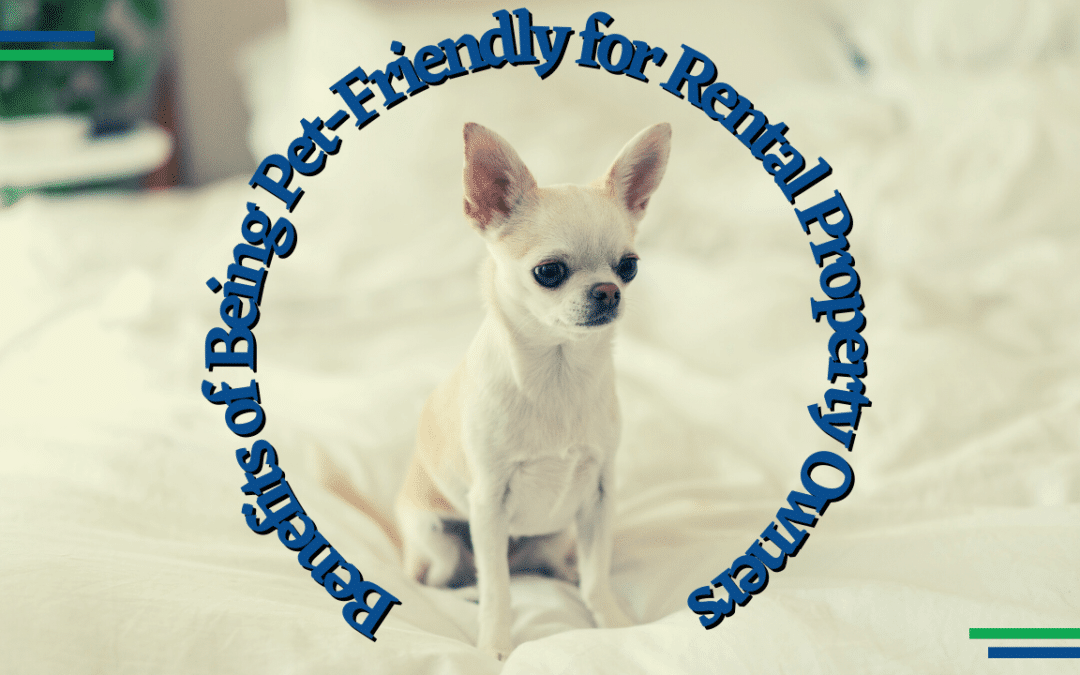Are you a pet owner?
If you are, you might understand why people are so passionate about their pets. Dogs and cats quickly become family members.
Even if you’re not a pet owner, you’ve likely noticed that pets are very special to the people who do own them. Pet owners invest a lot of time, love, and money into the care of their animals, and when it’s time to look for a new rental home, they won’t consider any properties that don’t allow pets.
So, you’ll have to decide if you’re going to be one of those properties. Do you want to make your rental a pet-friendly home, or would you rather avoid the risk and liability?
We always understand when owners hesitate. But with a strong pet policy and some proactive pet screening, you really won’t have much to worry about. It’s rare that a pet does more damage than the amount of a pet fee and the security deposit.
In our experience as Dallas Fort Worth property managers, we’ve found that the benefits of renting out a pet-friendly property almost always outweigh the risks.
Reduce Your Vacancy Loss with Pet-Friendly Dallas Fort Worth Rental Homes
If you look at the statistics, allowing pets into your rental property makes the most financial sense. That’s because a majority of renters own at least one pet. Not allowing pets in your rental property will lead to longer vacancies. It may take you extra time to find a tenant who isn’t moving in with a pet.
Why limit your tenant pool?
With fewer tenants interested in your rental home, you’ll be waiting a bit longer to place just the right resident. The entire leasing process is likely to move a lot faster when you offer a pet-friendly property. You’ll simply have more potential applicants.
Think about what vacancy costs you. Not only are you without income for those weeks or months, you’re also paying out of pocket for utilities. You’ve got to worry about unreported maintenance and safety issues. What if someone breaks in while the property is vacant?
Pets bring shorter vacancy periods. That’s one huge benefit. You’ll find a tenant faster.
Pet Owners Tend to Make Good Tenants
People who own pets are generally good people, and they tend to be responsible, positive renters.
This doesn’t mean they’re all perfect, but if you find a tenant who takes good care of their pet, you can be pretty sure that they’ll take good care of your property.
It’s easy to worry about the damage that animals can potentially do to a property, but you’ll find that pets actually cause much less damage than people do. Good pet owners are good tenants. They take care of their animals, they keep up with vet visits, and they take care of your property.
Most pet owners understand the extra costs that come with renting a home. They’ll be prepared to pay a pet fee or pet rent. They’ll agree to extra inspections. You’re likely to find pet owners to be easy to work with.
Pets Earn Dallas Fort Worth Owners More Income
Do you ever think about the rent you might be giving up by NOT allowing pets?
You can earn more because your property has a higher rental value when your tenant has a pet. You can charge a pet fee and/or pet rent. Or, you can charge a pet deposit if you’re willing to give that money back at the end of the lease term the same way you refund a security deposit.
Here’s how these options work for you:
- Pet fees are non-refundable amounts that tenants pay before they move in. You can collect the pet fee one time only and you collect it per-pet. So, if your pet fee is $300 per pet and your tenant moves in with two cats, that’s $600 you’ve earned just by allowing pets. You won’t give the money back, and you’ll be able to use it to pay for potential damages caused by the animals. However, it’s unlikely those damages will total $600.
- Pet deposits are a little bit different. Your tenant will pay the deposit before moving in, but you’ll only be able to use the money to pay for pet-related damage. You’ll have to return anything that wasn’t used at the end of the lease term. So, you may charge a $400 refundable pet deposit. If your tenant’s dog chews a hole in a wall and you pay $250 to repair it, you’ll need to return the remaining $150 from the pet deposit.
- Pet rent is paid every month that the tenant is living in the property with their pet. We’ve seen amounts that range from $25 per pet to $60 per pet. You’ll add this amount to the rental amount every month, giving you more income and a bit of a reserve in case you need to do cleaning or make repairs that are due to the pets.
Reduce the Risk of Lease Violations and Unauthorized Pets
Maybe you’ll move a tenant into your no-pet property and you’ll later discover dogs chained up outside during a drive-by.
Sometimes, tenants will be dishonest about their pets, especially if you don’t allow them.
When tenants sneak in pets, you have no control over them. You haven’t screened the pets, you don’t know if they’re up to date on shots and flea treatments, and you have no idea if the dog is on your insurance company’s restricted breed list.
Your lease should be clear about what the consequences are for unauthorized pets. Make sure you enforce it.
But, if you allow pets and you have a good pet policy in place, tenants will be less likely to violate your lease agreement and move in pets without you knowing it.
Higher Retention in Pet-Friendly Rental Homes
Pet owners don’t move quite as frequently as tenants who don’t have pets. That’s because they know there’s going to be another pet fee or pet deposit in the new place. They don’t want to pay that again. So, if they’re having a good rental experience, they’re likely to stay in place. This reduces your vacancy and turnover costs. It eliminates the stress of having to find a new tenant.
Protecting Your Dallas Fort Worth Investment Property
Now that you understand why it’s so much better to allow pets, what can you do to protect your investment and provide yourself with some peace of mind?
For starters, remember that you don’t have to allow every pet. You can say no to the twin Pit Bulls. Instead, consider pets on a case-by-case basis.
Screen pets as carefully as you screen your tenants, and make sure you have a strong pet policy in place. This is what that policy might look like:
- Gather specific pet information for screening. On your application, ask about pets. You’ll need to know how many pets the tenant has, what breeds they are, how big they are, and how old they are. Ask for names and photos. You can ask for veterinarian information, too. You can require records of vaccinations as well as flea and tick treatments.
- Set limits on the number of pets you’ll allow, and/or the size. For example, you can say that you’ll only allow one pet per property or two pets per property. You can require pets to be less than 30 pounds. You can require them to be at least two years old.
- Check with your insurance company about restrictions on dangerous breeds. Everyone who owns a Pit Bull or a Doberman will assure you that the dog is as sweet as can be. That may be true, but insurance companies tend not to cover dogs that are considered vicious. You should prohibit these breeds or require your tenants to purchase additional insurance that will hold you harmless if something happens.
- Conduct tenant reference checks with former landlords. When you’re evaluating a tenant’s rental history, ask current and former landlords about the pets. You’ll want to know if they were well-behaved, if there were any complaints, and if the pet was responsible for any damage.
When you have a tenant with pets, conduct routine inspections. This will protect your Dallas Fort Worth rental property because you can be sure there isn’t any pet damage or mess being tolerated at the home. When you drive by the home, you can check to see that dogs are on leashes, and you’ll know that the lawn has not been torn up by the animals. When you go inside the home to conduct a maintenance inspection, look for signs that the pet may be making messes or causing problems. Address any issues with your tenant.
Service animals, companion animals, and emotional support animals are not considered pets. You cannot prohibit those animals, and you cannot do things like charge pet rent or pet fees. The law protects your tenants against any such restrictions because these animals are not seen as pets – they are accommodations. Don’t forget that while you have the choice to allow or not allow pets, you may not prohibit service or companion animals when tenants are moving in with them.



Recent Comments